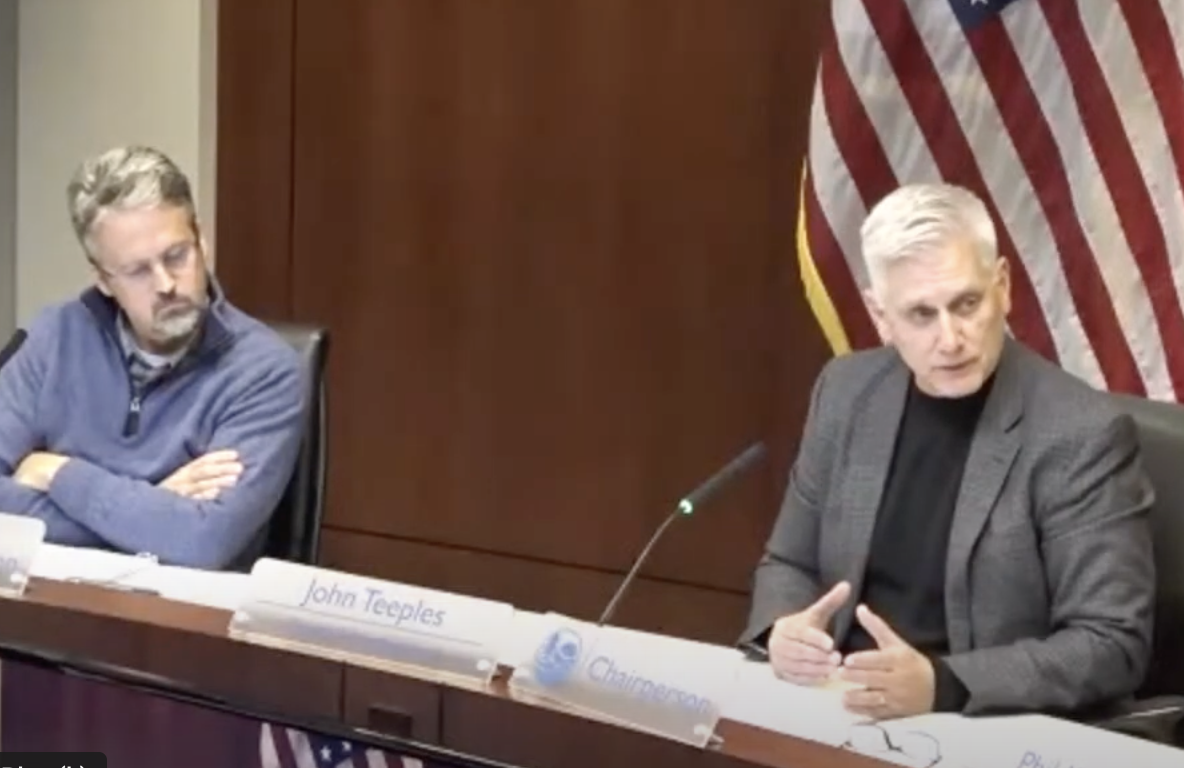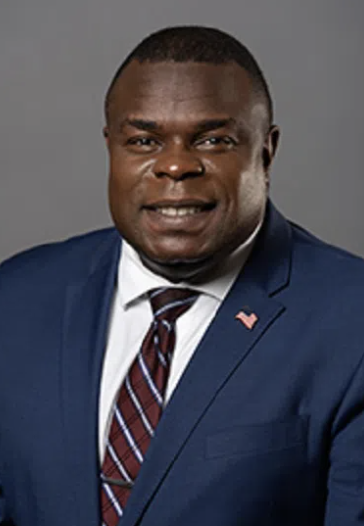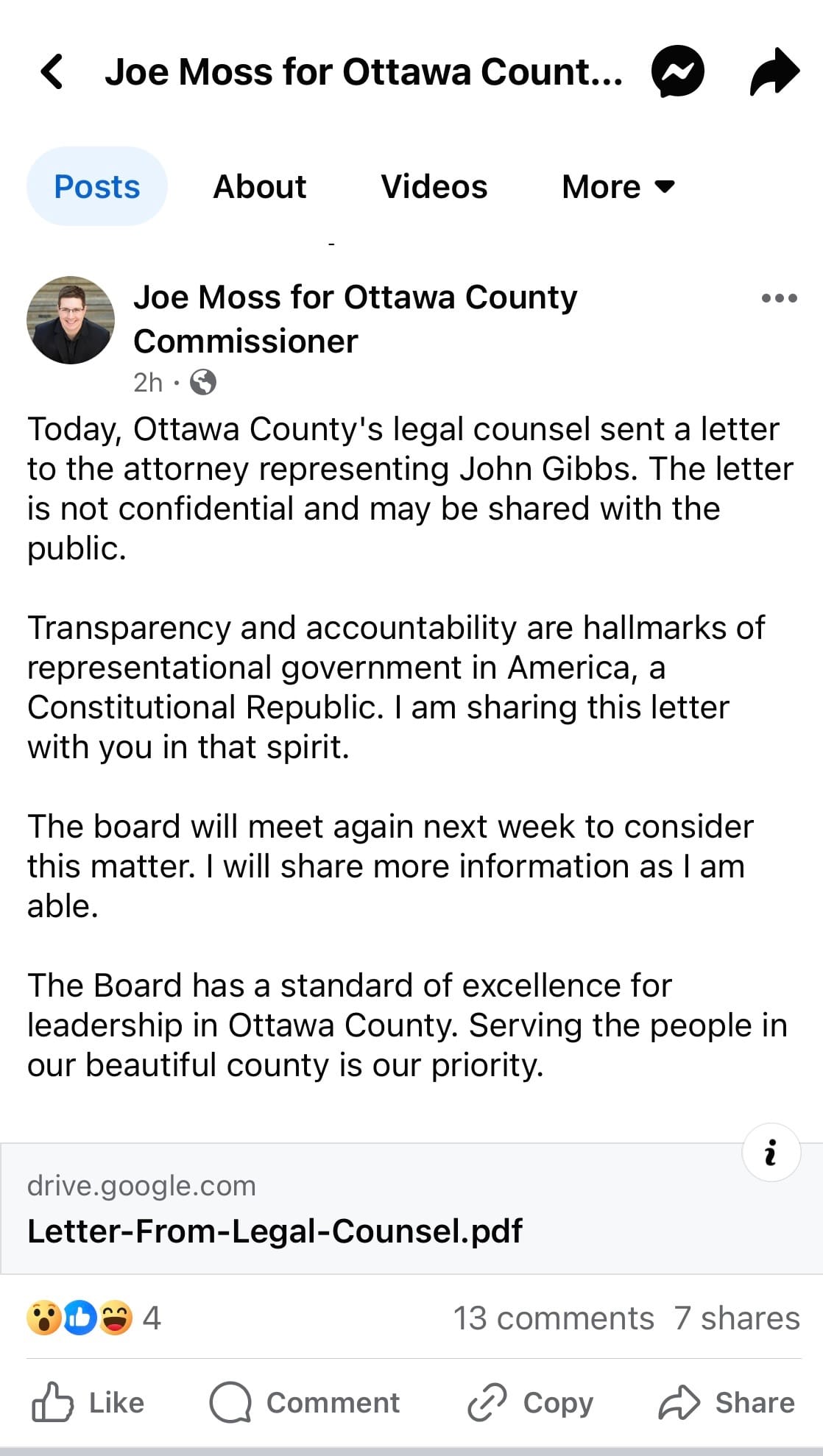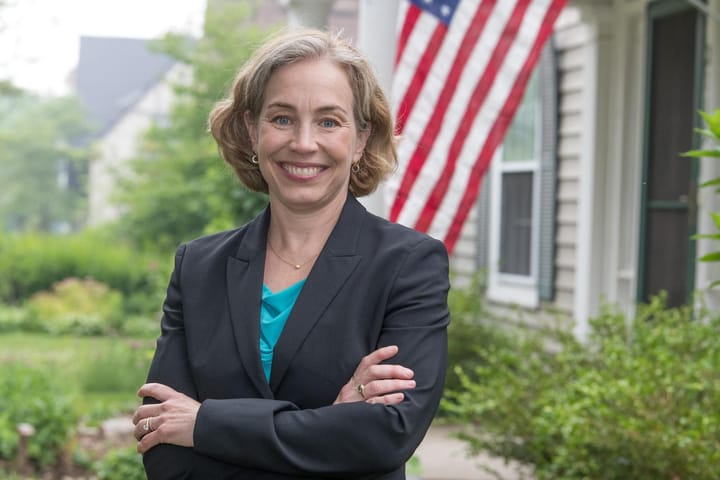'We're in this bad deal because of you': Gibbs lawsuit settled as allegations fly between officials
The Ottawa County Board of Commissioners may have settled its latest lawsuit with its former administrator, but tension continues to mount between the board’s new leadership and Ottawa Impact commissioners who are now in the minority.

OTTAWA COUNTY — The Ottawa County Board of Commissioners may have settled its latest lawsuit with its former administrator, but tension continues to mount between the board’s new leadership and Ottawa Impact commissioners who are now in the minority.
Goooood evening, Ottawa County! Let's get going with the latest installment of the county board of commissioners and doing the people's business! pic.twitter.com/33gtwSX2Xh
— Sarah Leach ☮️ (@ONNLeach) January 28, 2025
The commissioners met on the evening of Tuesday, Jan. 28, to tackle key topics, most importantly settling litigation brought by former administrator John Gibbs.
What should have been a straightforward process of the board going into closed session and then taking a public vote took an unexpected turn when commissioners voted to discuss the potential settlement publicly — leading to officials pointing fingers over who ultimately was responsible for the county being in the position to pay out a fourth six-figure settlement within two years.
The board voted 7-4 to approve a $190,000 settlement to Gibbs, with one-third ($63,333) going toward his attorney’s fees.
The board has paid out more than $700,000 over the past year to settle four of the seven lawsuits filed between February 2023 and December 2024. One case was dismissed over allegations that the former board violated the Open Meetings Act.
Two lawsuits remain active against the board:
- A lawsuit filed in November claims Freedom of Information Act requests filed by the two plaintiffs were not fulfilled adequately to what state law requires. The case has a hearing scheduled for Feb. 3.
- A lawsuit filed in December challenging the legality of a trio of controversial decisions approved by the board, including two severance agreements and a contract to remediate Crockery Lake for more than half a million dollars.
How we got here
The new term, which began Jan. 2, marks a shift after far-right fundamentalist group Ottawa Impact lost its majority on the board, which saw seven lawsuits over the past two years and settlement payouts that have topped over half a million dollars.
Several members of OI lost their bids for re-election and the group’s representation dropped from six seats on the 11-member board to four as commissioners began a new four-year term this month.
Now the board has three distinct factions: six non-OI Republicans, four OI Republicans and one Democrat — the most politically diverse board in county history.
The dynamics between those groups have, at times, been collegial, but there also have been several tense exchanges between the former majority members and the current ones.
Read More: New dynamics on Ottawa County board yield clashes, some consensus
Those tensions boiled over into outright accusations Tuesday evening as the board weighed whether to approve the Gibbs settlement.
Gibbs filed a lawsuit on April 8 in federal court claiming the board retaliated against him, violated his First Amendment rights and that then-board chair Joe Moss defamed him on social media.

Gibbs was fired Feb. 29, after Moss motioned to terminate the administrator for cause — largely focused on allegations brought forward by two employees who had been working for Gibbs for a handful of months.
Gibbs said the accusations from Executive Aide Jordan Epperson and then-Deputy Administrator Wetmore were manufactured after Gibbs identified "corruption and opposed bad governance" by the board.
They targeted Gibbs "by concocting a laundry list of miscellaneous, contrived allegations that only saw the light of day after I attempted to hold them accountable," Gibbs said after he was fired.
Gibbs, who was hired by the Ottawa Impact majority on the board, said he was punished for disagreeing with Moss and Kallman Legal Group, the county's current corporation counsel, on several policies and strategies.
In an order issued Wednesday, Dec. 4, U.S. District Judge Jane M. Beckering dismissed the top count of John Gibbs’ lawsuit against Ottawa County, saying the former administrator didn’t sufficiently argue that he aired criticisms as a private citizen against Kallman.
Gibbs’ was in the process of appealing the ruling; meanwhile, private arbitration was ongoing between Gibbs and the county over the former’s breach of contract claim. That process ultimately led to a negotiated settlement that was approved by the county’s insurance authority on Jan. 20 — after that body conducted a closed session with its legal counsel.
OI commissioners attempt to thwart discussion
The lawsuit was listed as the last item on the board’s action agenda for Tuesday’s meeting, as board Chair John Teeples anticipated commissioners would discuss the issue in closed session with their litigation attorney, Mike Bogren of Grand Rapids law firm Plunkett Cooney.
Onto a motion to go into closed session to discuss the Gibbs settlement: pic.twitter.com/QAkyGjDb05
— Sarah Leach ☮️ (@ONNLeach) January 29, 2025
Michigan’s Open Meetings Act requires public entities, such as governmental boards, to conduct their meetings and make their decisions in open session, meaning allowing the public to observe. The OMA provides some exemptions that allow public bodies to discuss things in closed session — outside of public view — including when discussing legal strategies and receiving legal counsel amid litigation.
To go into closed session, the board needed a two-thirds majority (8 out of 11) who voted in favor of the move. The motion to go into closed session failed, however, after five commissioners — including all four OI commissioners — voted against the move.
Vote to go into closed session:
— Sarah Leach ☮️ (@ONNLeach) January 29, 2025
Yes: Jorritsma, Barry, Zylstra, Kuyers, Bonnema, Teeples
No: Miedema, Rhodea, Moss, Wenzel, Brugger
Commissioner Doug Zylstra, the board’s lone Democrat, then moved to add the discussion to the board’s action agenda in open session.
“I understand the closed session item, it didn't pass. Absent a closed session, I don't know how we are to discuss this issue,” Zylstra said.
Teeples was hesitant to back the idea. As a licensed attorney and experienced court mediator, he cautioned his colleagues about the potential legal ramifications of conducting the settlement discussions in open session.
“There's a reason we have closed session,” he said. “One of the drawbacks of having an open discussion in a settlement discussion is you may limit your ability to negotiate the settlement. I just want (you) to be aware that that's what we're choosing to do.”
Moss said he voted against going into closed session because it was a “horrible deal” for the county; he said he wanted the matter to be sent back to the insurance authority to continue negotiations.
“Based on the information that I have in the current terms that were presented, I think that more work needs to be done and this needs to come back in February,” Moss said.
OI Commissioner Allison Miedema agreed, saying she also didn’t agree with the deal.
“There's nothing that's been shared (with) me that I want more information presented to me in closed session,” Miedema said.
Teeples said sending the settlement issue back to the insurance authority wasn't an option.
“We're at the point of discussing the things the insurance authority can not handle,” he said. “We're at the stage where only we can decide.”
Vice Chair Josh Brugger, a non-OI Republican, said he voted against going into closed session because he wanted more transparency on the issue.
“There's been enough secrecy on this topic," he said.
The comment was a swipe at the former OI majority; the former board has been accused of at least four Open Meetings Act violations in the context of the various lawsuits filed since 2023.
“We need to discuss it in public or in private. Not discussing it isn't an option,” Brugger said. “Transparency is what matters here. I've had enough of closed doors.”
Moss, who also was sued individually for defamation in the lawsuit, moved to send the settlement back to the insurance authority. After that effort failed in 7-4 vote, he said he didn’t want the matter discussed openly.
“I don't think it should be considered in open session,” he said.
“If you don't like it, vote no on it or motion to amend it,” Zylstra replied.
Accusations fly over who’s to blame
Once the board voted to consider approving the deal in open session, Teeples outlined the specific terms that the board needed to consider. The total payout would be $190,000 broken down as:
- One-third for non-economic loss (punitive damages)
- One-third for economic loss, subject to taxation (lost income)
- One-third to Gibbs’ attorney, Noah Hurwitz
In addition, the county would rescind Gibbs’ termination of employment and remove any reference to the termination of his employment file. The county would then agree to accept a resignation letter and add it to his personnel file.
In exchange for approving the deal, Gibbs agreed to release all legal claims against the county, meaning the separate arbitration and federal lawsuit processes would end.
Hurwitz, of Ann Arbor-based Hurwitz Law, did not respond to multiple requests for comment.
Moss renewed his opposition to the deal: “Yeah, I think it's a bad deal and we shouldn't do it.”
That drew the ire of Commissioner Jacob Bonnema, a former member of OI who is now in the traditional Republican majority.
“We're in this bad deal because of you. Because you hired John Gibbs ... and also how you fired John Gibbs. So we're in this situation because of you,” he said.
Moss reminded Bonnema that he voted in favor of firing Gibbs on Feb. 29, 2024, but Bonnema said he had little choice.
“I did, to wrap up this terrible situation that you put us in,” Bonnema told Moss.
Zylstra, who voted against firing Gibbs last year, said the county didn’t have the justification for firing the former administrator when it did.
“I just want to say I did vote no on relieving Mr. Gibbs and was pretty clear why. The board put together a case against Mr. Gibbs ... but I voted no because I didn't think we had cause to fire him at the time,” he said. “No one wants to pay anyone $190,000, but it's less than $210,000 and I want to put this in the rearview mirror.”
If the county had fired Gibbs without cause, it would have been contractually obligated to pay him $210,000 — the equivalent of one year’s salary — plus benefits.
Moss’ OI colleagues — Allison Miedema, Sylvia Rhodea and Kendra Wenzel —seemingly opposed any settlement with Gibbs, citing what they described as poor performance and problematic behavior.
“I cannot support the harmful precedent this sets,” Miedema said. “I will be a hard no on this.”
Wenzel read a statement from former OI commissioner Gretchen Cosby, who lost her re-election bid last year, calling Gibbs' lawsuit claims "baseless attacks" and that he "spread malicious falsehoods."
In her statement, Cosby said the settlement shouldn't be approved because it would be "sacrificing integrity for convenience” and that Gibbs "weaponized dishonesty" for "financial gain."
Bonnema asked what the OI commissioners’ hopes were by rejecting the deal.
“Do you want these guys on the stand sharing emails instructing him to not work with half the board?” Bonnema said. “You want all of that out there? You want to litigate this?”
Moss replied: “That's not true.”
Bonnema said Moss acted inappropriately when he published on social media internal complaints made against Gibbs by former interim administrator Ben Wetmore (who was promoted in November) and executive aide Jordan Epperson — which days later were used to justify the firing.
Bonnema saying Moss "pushed through all these claims ... the things you pushed out on social media."
— Sarah Leach ☮️ (@ONNLeach) January 29, 2025
Here is Moss' Feb. 21 FB post prior to firing Gibbs on Feb. 29, 2024 (*He has since deleted the post). pic.twitter.com/p1sXdtMHnQ
Wetmore and Epperson were given severance agreements last year, championed by the OI majority, to preemptively settle alleged legal claims they could have made against the county. Those details have not been made public to date and have been legally challenged in a lawsuit filed Dec. 16.
Read More: County commissioners say they were misled, pressured to approve severance agreements
The complaints Moss made public included allegations that Gibbs made disparaging comments about female members of the board, derogatory comments about commissioners' faith, and threats of violence against county attorney Jack Jordan.
At the time of the firing, Moss (who made the motion) said: “The board has determined that Mr. Gibbs, in connection with the performance of his duties under the employment agreement, has been dishonest, committed gross misconduct, and/or committed willful malfeasance."
Bonnema told Moss he regretted voting in favor of the termination.
“I do wish I had voted differently because I do believe there was cause to fire Gibbs that would have been upheld in court,” Bonnema said. “Things like how he handled the (Kimball) case, the Hambley case ... how he treated half the board.”
Moss said there were additional performance issues with Gibbs, such as him missing a board meeting prior to being fired.
“But that wasn't the reason we fired him,” Bonnema replied.
Bonnema asked what terms Moss would find acceptable to approve a settlement.
“What do you want to get this down to? $150,000? $110,000? What's your number, Joe?”
“I don't have a number,” Moss replied. “Mr. Gibbs had an opportunity to resign. He specifically said he would and instead of doing it, he hired a lawyer. I don't have a dollar amount. I think the principle here is less about the dollar amount and more about the fact that he wants both to be paid and to have his termination rescinded.”
Brugger said the former OI majority needed to take responsibility for its own decisions.
Brugger said “mistakes were made when hiring Gibbs” and that “the individuals who made those mistakes … a number of them lost their seats, but they all made a mistake in hiring him.”
“The county paid a price. The employees paid a price. Mistakes were made when firing Gibbs,” Brugger said. “When you make a mistake, you own it. You apologize for it and you offer to fix it.”
He said the non-economic portion of the settlement amount “is directly tied to you, Joe, because I don't think you represented the reasons accurately," referring to Moss’ Feb. 23 Facebook post that publicly released the allegations Wetmore and Epperson made.
Moss has since deleted the post.
Moss pushed back, saying Brugger was trying to “assign blame” to him individually, when the entire board opted to fire Gibbs.
“I take offense at that,” Moss said. “You are referring to me and the way that I represented to the board ... this was not something that one commissioner did.”
“I was referring to your Facebook post,” Brugger said.

Moss then claimed that, “per litigation counsel,” the information he posted was public information.
Teeples appeared surprised that the county’s corporation counsel would endorse Moss publicly posting the allegations against Gibbs without a human resources investigation or board determination.
“Per litigation counsel, it was a public record,” Moss said.
“They approved you doing that?” Teeples replied.
“They said we could post it,” Moss said.
“The county attorneys said you could post that ... online?” Teeples answered.
Moss: No. Per litigation counsel, it was a public record.
— Sarah Leach ☮️ (@ONNLeach) January 29, 2025
Teeples: They approved you doing that?
Moss: They said we could post it.
Teeples: ... The county attorneys said you could post that ... online?
“What I'm saying is it was a public record,” Moss said. “For the county and for transparency ... that was why it was put out.”
Teeples said that would be accurate only if the information was subject to a Freedom of Information Act request.
The complaints were outlined in a letter dated Feb. 23 from third-party attorney Brook J. Bisonet. The document likely would not have been subject to a FOIA request, as it was a legal communication and would have fallen under the exemption of attorney-client privilege (the county retained Bisonet’s services to produce the letter).
“No one even knew to FOIA for it. You put it out before we knew it existed,” Bonnema said. “You raised the liability on us exponentially by what you personally did on your Facebook page.”
Rhodea said the current majority was framing the issue as if “very little would (have) led to a termination — and that's simply not true. This process was very painful for this board and it was not desired. As behaviors began to happen ... we were very hopeful that it would not reach this conclusion.”
Rhodea attempted to link Gibbs’ termination to one of the lawsuits filed against the county in October 2023 that alleged Gibbs committed age discrimination when he hired Epperson over Ryan Kimball, an older, more qualified candidate. The county settled with Kimball in September with him receiving $225,000 for damages and legal fees.
“As you know, we ended up in litigation in the Kimball case due to Gibbs' behavior,” Rhodea said. “That was the straw that broke the camel's back, so to speak. To have him come back now a year later and ask for money and us to withdraw the termination ... he then goes out and trashes the board and says things that are completely not true about us. I have a real problem with his hurtful behavior.”
Rhodea also claimed that Gibbs "admitted that he had done what he was accused of doing in the Kimball case."
The timeline of Rhodea’s argument, however, didn’t line up for other commissioners.
“We didn't settle the lawsuit until after the termination,” Zylstra said. “The idea that you are going to hang Kimball around his neck when we settled that case months afterward …”
“So, you're saying you wouldn't have held the Kimball case against him?” Rhodea asked.
“That's not the question,” Teeples said. “I'm not saying it's wrong. It wasn't done in the proper way to do a proper discharge. It's weak.”
Commissioner Jim Barry, a non-OI Republican, said the county didn't follow proper process.
“The process is to involve a human resources professional to build a case ... there should have been a writeup in his file. Now, you're trying to do 'he said this and did this.'”
Despite Moss claiming “there is a lot of documentation,” Teeples said the county had significant liability if the case were to be litigated in court.
“This is the problem: If you don't document your file before making decisions like this ... we can't be raising verbal arguments after the fact. The file controls here,” he said. “I know how to document a termination claim. You do it methodically and carefully. In this case, it didn't happen that way.”
Teeples said initial negotiations began at $650,000 and arrived at the $190,000 figure. He said if the case were to go to court, the county likely would see costs of up to $300,000 — not including what it would have to spend to pay its own attorneys.
“That's just one side in payment to Gibbs and payment to fees. There's no guarantee of winning,” he said.
Teeples said the individual claim against Moss also was problematic, seemingly acknowledging that defamation occurred.
“(It) never should have happened ... but did,” he said.
Teeples told his colleagues that he wasn’t endorsing Gibbs, but rather fixing the mistakes of the prior board.”
“To suggest that he's getting off the hook ... it's just not happening here. This is a way to stop this bleeding. We need to make a practical decision for the community ... to move ahead.”
Support Our Work
Ottawa News Network is a nonprofit news service dedicated to providing the residents of Ottawa County with trustworthy, community-driven news. ONN treats journalism as a public good — something that enriches lives and empowers Ottawa County’s 300,000-plus residents to stay engaged, make informed decisions, and strengthen local democracy. Please consider giving today.
Other actions during the meeting
- Commissioners approved a temporary contract with new Interim Administrator Gary Rosema, who is a retired Ottawa County sheriff. The agreement was for Rosema to work in the role for six months, while the county conducts a search for a new permanent administrator. Rosema will receive $14,000 per month, plus an automobile allowance of $500 per month. He also received 10 days of paid vacation.
- Rosema told commissioners during his administrator’s update that he had hired retired Ottawa County prosecutor Ron Frantz as the interim deputy administrator in order to facilitate day-to-day operations as well as assist in the administrator search.
- A representative from the county’s fiscal services department said language for a request for proposal, or RFP, to solicit bids from employment search firms was being finalized and would be posted soon. The representative estimated that the county could select a search firm as early as late February and have a contract in place for the firm to conduct the work as early as mid-March. At that point, the formal search for the next administrator — which would be the sixth in just over two years — could begin.
- Commissioners approved the creation of a five-member ad hoc committee, the Appointment and Alignment Committee, to handle board and committee recruiting and appointments. The committee replaces the county’s Talent and Recruitment Committee.
- The board voted to appoint Commissioner Jordan Jorritsma, a non-OI Republican, to the county’s Community Mental Health Board after former Cosby resigned earlier this month. Despite the reappointment of former CMH board chair Vonnie Vanderzwaag being on Tuesday’s agenda, commissioners opted to allow the new Appointment and Alignment Committee to decide whether or not to advance Vanderzwaag for reconsideration before the full board.
- The board approved a contract for Community Spoke, a local organization that helps coordinate the efforts of other nonprofits. The OI majority refused to fund the contract in August despite it being requested by former interim administrator Jon Anderson (who resigned in November) and after advancing through the OI-controlled Finance and Administration committee. In August, Miedema said information presented by the health department about the contract felt “kinda shady.” She and the other OI commissioners renewed objections to funding the organization, saying they espoused diversity, equity and inclusion language in their materials. Despite reviewing the information in the summer, Miedema, who dubbed the contract “controversial,” said she “would feel more comfortable pulling this one off ... and have some materials sent to us.” The contract was approved in a 7-4 vote along party lines.
- Miedema raised her displeasure over committee assignments, saying that despite having an equal number of committee appointments as nearly all the other members on the board, she didn’t like an inference that she and her fellow OI commissioners were “in the minority.”
— Sarah Leach is the executive editor of the Ottawa News Network. Contact her at sleach@ottawanewsnetwork.org. Follow her on Twitter @ONNLeach.



